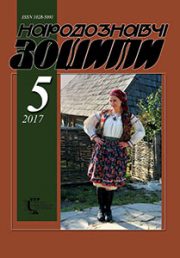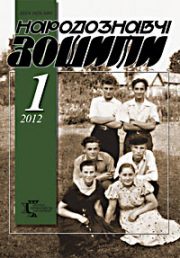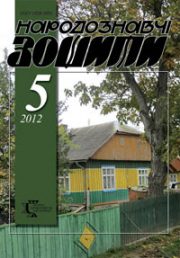The Ethnology Notebooks. 2021. № 3 (159), 700—708
UDK 821.161.2″18/19″-32Стефаник.091:821.16″18/19″
DOI https://doi.org/10.15407/nz2021.03.700
VASYL STEFANYK IN THE POLISH-UKRAINIAN DIALOGUE
HNATIUK Mychajlo
- ORCID ID: https://orcid.org/0000-0003-0742-8272
- Doctor of Philology, Professor,
- Ivan Franko National University of Lviv,
- Department of Theory of Literature and Comparative Literature,
- Head of Department,
- 1, Universytetska Str., 79000, Lviv, Ukraine,
- Contacts: e-mail:mychajlo.hnatiuk@gmail.com
Abstract. Problem statement. The 150th anniversary of Vasyl Stefanyk, which is celebrated in 2021, has significantly intensified the study of the writer’s work. It is noteworthy that Ukrainian and foreign literary critics have already departed from Soviet stereotypes, which interpreted the master’s work only as a «singer of the disadvantaged peasantry». Today, a large number of Stefan scholars try to present the work of a talented novelist as a follower of European modernists. Meanwhile, the writer himself developed his own, Stefanyk style of writing, completely original, different from everything that was in Ukrainian literature so far. The main subject of the image in his works was the fate of the Pokut peasant, as well as the newborn intelligentsia.
The article is devoted to the analysis of modernist searches in the literature of the late XIX — early XX centuries (object of study).
The author explores V. Stefanyk’s contacts with the Ukrainian and Polish artistic circles of Lviv and Krakow of that time, emphasizing the unique individual manner of the Ukrainian novelist (subject of study).
The cultural and artistic environment of Krakow undoubtedly influenced the development of the new modern style of V. Stefanyk’s narration. Expressionism as the basis of the writer’s creative thinking was the source of his artistic individuality, which had a significant impact on the further development of Polish and Ukrainian literature.
Applied research methods: biographical, textual, historiographical, comparative and generalization method.
Keywords: Vasyl Stefanyk, literary environment, author’s individuality, modernism in Slavic literatures, impressionism, expressionism.
Received 14.06.2021
REFERENCES
- Chernenko, O. (1989). Expressionism in the works of Vasyl Stefanyk. Munich: Modernity [in Germany].
- Stefanyk, V. (1971). Autobiography (1929). In Stefanik V. Works (Pp. 5—13). Kyiv: Dnipro [in Ukrainian].
- Lepky, B. (1991). Three portraits (Ivan Franko, Vasyl Stefanyk, Vladislav Orkan). In Lepky B. Works: іn 2 vol. (Vol. 2, pp. 651—667). Kyiv: Dnipro [in Ukrainian].
- Klinovy, Y. (1983). Yuri Morachevsky, his parents, his friends. Modernity, 11 (27), 7—24. Munich [in Germany].
- Morachevsky, V. (1983). Autobiography. Yuri Morachevsky, his parents, his friends. Modernity, 11 (27), 7—24. Munich [in Germany].
- Morachevsky, Y. (1983). Byzantinization or barbarization? Klinovy Yuri Yuri Morachevsky, his parents, hisfriends. Modernity, 11 (27), 7—24. Munich [in Germany].
- Morachevsky, V. (1970). Vasyl Stefanyk. In Vasyl Stefanyk in criticism and memoirs (Рр. 301—310.). Kyiv: Dnipro [in Ukrainian].
- Stefanyk, V. (1949—1954). Letter to V. Morachevsky from August 1899. In Stefanyk V. Works: in 3 vol. (Vol. 3. pр. 192—193). Kyiv: Publishing House of the USSR Academy of Sciences [in Ukrainian].
- Stefanyk, V. (1949—1954). Letter to V. Hamorak from 7.II.1899. In Stefanyk V. Works: in 3 vol. Vol. 3, p. 167). Kyiv: Publishing House of the USSR Academy of Sciences [in Ukrainian].
- Pshybyshevsky, S. (1970). From the earth to the born creator. In Vasyl Stefanyk in criticism and memoirs (Рp. 281—282). Kyiv: Dnipro [in Ukrainian].
- Undertaker, F. (1976). Vasyl Stefanyk in Slavic literature. Kyiv: Naukova dumka [in Ukrainian].
- Petshytsky, J. (1970). Novels by Vasyl Stefanyk in Polish. In Vasyl Stefanyk in criticism and memoirs (Рр. 151—152). Kyiv: Dnipro [in Ukrainian].
- Stefanyk, V. (1949—1954). Letter to V. Morachevsky dated July 26, 1895. In Stefanyk V. Works: in 3 vol. (Vol. 3. pр. 38—39). Kyiv: Publishing House of the USSR Academy of Sciences [in Ukrainian].
- Stefanyk, V. (1949—1954). Letter to V. Morachevsky dated November 25, 1895. In Stefanyk V. Works: in 3 vol. (Vol. 3, p. 48). Kyiv: Publishing House of the USSR Academy of Sciences [in Ukrainian].
- Stefanyk, V. (1949—1954). Letter to O. Hamorak dated January 1900. In Stefanyk V. Works: in 3 vol. (Vol. 3, pр. 196—197). Kyiv: Publishing House of the USSR Academy of Sciences [in Ukrainian].
- Lesya Ukrainka (2021). Little Russian writers in Bukovina. In Lesya Ukrainka. Complete academic collection of works: in 14 vol. (Vol. 7, pp. 97—112). Lutsk [in Ukrainian].
- Stefanyk, V. (1949—1954). Letter to O. Hamorak dated 21.XI.1903. In Stefanyk V. Works: in 3 vol. (Vol. 3, p. 243). Kyiv: Publishing House of the USSR Academy of Sciences [in Ukrainian].
- Undertaker, F. (1991). Without censorship bills. Fatherland, 5, 151—168) [in Ukrainian].
- Stefanyk, V. (1949—1954). Letter to D. Lukiyanovych dated April 4, 1926. In Stefanyk V. Works: in 3 vol. (Vol. 3, p. 248). Kyiv: Publishing House of the USSR Academy of Sciences [in Ukrainian].
- Stefanyk, V. (1949—1954). Works: in 3 vol. (Vol. 3). Kyiv: Publishing House of the USSR Academy of Sciences [in Ukrainian].






